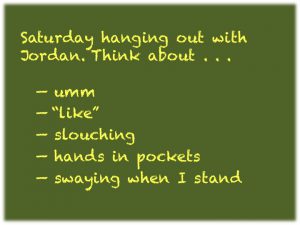
- Barbara Egel Presentations
Often, our learners walk into Turpin workshops expecting to focus on the little habits that are hard to break: saying “um,” “uh,” “like,” or “you know” too much; using uptalk (that habit that makes every statement sound like a question); fidgeting/not standing still; keeping hands in pockets; making a particular face or gesture. Our response is to say that when you are truly engaged and practicing both good, meaningful eye contact and thoughtful pausing, those habits tend to fall away. And most importantly, when you are presenting in a real work situation, we want you focused on engagement and explaining and discussing your content, not being distracted by concerns about goofy little habits.
However, if you’re someone in whom the habits are clearly really ingrained, or you want to work on your particular habit just to make sure it goes away, I advise that you work on it in your real-life, low-stakes conversations. This has several benefits:
If you truly do work on your habits in normal conversations at work and at home, by the time your next presentation rolls around, the problem will be gone or at least seriously diminished.
- It will keep you from fixating on negative observations about yourself during your presentation, which is a guaranteed way to disengage from your audience and end up spinning inside your own head. That spinning kills your effectiveness much more certainly than any amount of uptalk or “like” ever could.
- Working on these things when talking with your friends or discussing work with colleagues informally is a safe way to improve your presentations when the stakes are low.
- You will be perceived by everyone you encounter as more adult, more authoritative, and more credible once your speech and stance have been permanently rid of these habits. A side benefit is that it works wonders with the cable guy, your significant other’s parents, and snooty restaurant hosts.
In short, if there’s a presentation habit that’s driving you nuts, bring it out of the presentation space to work on in your day-to-day life so that by the time you’re in front of an audience, you, like, um, totally trust yourself to be on top of those habits, right?

 If you truly do work on your habits in normal conversations at work and at home, by the time your next presentation rolls around, the problem will be gone or at least seriously diminished.
If you truly do work on your habits in normal conversations at work and at home, by the time your next presentation rolls around, the problem will be gone or at least seriously diminished.